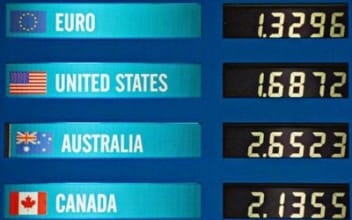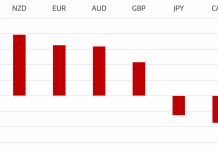If you have a lot of money to invest, then you essentially have two options. You can invest it in a low-risk way, such as putting it into a savings account or a range of buy-and-hold investment vehicles such as unit trusts, or you can go for a higher risk level in search of greater capital growth. Here, we’re going to take a look at two of the more high-risk/high-return options for high-end investors, namely currency trading and hedge funds, and weigh up the pros and cons of each approach in turn.
Currency Trading

Forex Trading is a popular option among high-end investors, and there are several reasons for this. Firstly, like all forms of online trading, it gives you direct control over your investments. This can be a good or a bad thing, depending on how good you are at trading, but of course you can always improve by following educational guides and using the demo account to hone your skills.
Secondly, it is a relatively simple market to understand. Unlike share trading, where you have hundreds or even thousands of companies to choose between, there are only a handful of major currency pairings that are commonly traded. This allows traders to focus in on what makes these currencies change in value, and if you have an interest in economics anyway, it’s the perfect way to leverage this knowledge.
Thirdly, currencies can be traded on margin. This allows traders to trade ‘as if’ they were putting down a much bigger stake than they could otherwise afford to, thereby amplifying any profits that you make. Unfortunately, it has the same effect on losses, but you can put measures in place (such as stop losses) to give you some protection against this eventuality.
Finally, you can trade the forex market at any time of the day or night, from Sunday evening through to Friday evening. This is because the forex market has no centralised exchange, taking place between markets in all four corners of the globe around the clock. This means that you can fit it in around your schedule, whatever that might be. The same cannot be said of other markets, such as the stock market, which are only open during specified market hours – especially inconvenient if you work full time.
Currency values are quite volatile, which is good as it provides plenty of opportunities to make a profit, but their movements can often be seemingly irrational. This means that you have to use a variety of techniques to analyse the market, and you have to keep quite a close eye on price movements while you have trades open.
There are, however, alternatives to this type of high-intensity active trading, in the form of copy trading and algorithm trading. Copy trading is a relatively new phenomenon, whereby investors can see the trading track records of various online traders, and set up their platform to copy all their trades in real-time, often with a subscription fee or commission. Algorithm trading is a method whereby you use pre-programmed scripts, or scripts you have written/customised yourself, to make trades automatically when certain conditions are met. Both techniques can be dangerous, especially if you don’t set them up properly, but if you give either one the care, attention, and respect that is required, they can be highly profitable alternatives to active trading.
Forex trading generally involves quite a high level of initial investment, and because it is so risky, you should never invest money in this way that you are not prepared to lose. However, if you succeed at it, forex trading can be a very rewarding activity, both financially and in terms of personal satisfaction.
Hedge Funds

These lightly regulated private partnerships require quite a lot of starting capital, and when you invest in one you are effectively handing your money over to a professional trader to try and make more money with. It’s a little like giving a high-stakes poker player a stack of money to enter a game with on the condition that they give you most of the winnings, plus your original stake back, at the end of the game. Ok, it’s not quite as risky as that sounds in many cases, but the principle is the same.
Hedge fund managers make use of a wide range of trading strategies in order to achieve high returns for their investors, and may exploit any opportunity in the market that they consider to have a favourable risk to reward ratio. As fund investments go, however, hedge funds are by far the riskiest so as with forex trading, you should only invest what you can afford to lose. These funds have a lot more freedom to make any type of investment, as they are not as bound by regulation as ‘real money’ funds such as unit trusts, pensions, and endowments.
They also have the highest bar for entry of any type of investment vehicle. Because of the risk involved, and the investment criteria, hedge funds are only available to elite investors who can meet the strict criteria laid down by the US Securities and Exchange Commission (SEC), specifically the need to have a net worth of at least $1 million and an annual income of at least $200,000 for the past two years.
Which is best?
It all depends on how directly you want to be involved with the markets, and how much money you have to start with. If you want to get your hands dirty by trading the markets directly, then forex trading is one of the best ways to do that. It doesn’t require massive amounts of starting capital, and it can also be very educational. On the other hand, if you are not confident in your trading skills, and have plenty of money to begin with, then hedge funds can be a good way to gain exposure to the markets without needing any specialist knowledge. If you don’t want to trade in the markets directly, but you don’t meet the criteria for investing in a hedge fund, then copy trading might provide an elegant solution for the high-end investor. At the end of the day, all of these activities are very risky, so you should think of them in terms of being a gamble rather than an investment, but they also both provide excellent profit opportunities if you do it right.
Tradersdna is a leading digital and social media platform for traders and investors. Tradersdna offers premiere resources for trading and investing education, digital resources for personal finance, market analysis and free trading guides. More about TradersDNA Features: What Does It Take to Become an Aggressive Trader? | Everything You Need to Know About White Label Trading Software | Advantages of Automated Forex Trading










































